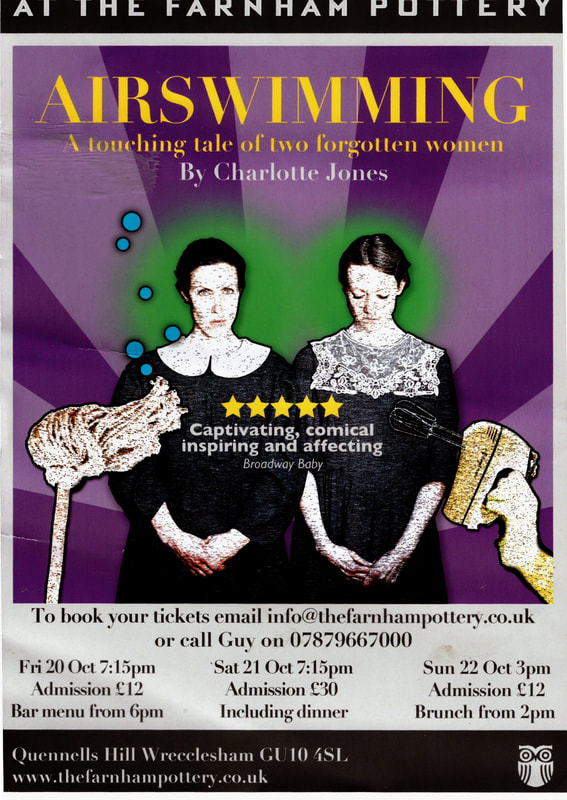|
Airswimming by Charlotte Jones.
The Weird Sisters Theatre Company. Directed by Stephanie Goodfellow. This play moved me by turns to laughter, outrage, pity and finally real tears. It was staged this week at Farnham Potteries, Guy Hains’s wonderfully atmospheric arts centre on the outskirts of Wrecclesham, near Farnham, Hampshire. For me, the spare setting and intimate performance space of the beautifully restored Pottery added an extra dimension to the play’s narrative. In 1924, when the play opens, “Asylums for the Criminally Insane” were full to overflowing with people who had been “put away” by their families and the judicial system as deviants from the social norms of the time. Many lived out their whole lives there, cut off from the outside world, without hope of release. “Airswimming” was written in 1997, only 25 years after cases like those of Persephone (“Porph”) and Dora (“Dorph”) were brought to the eye of reformers and inmates were released into a world where they no longer had a place. When the play opens, we meet two young women as they begin their friendship in “St Dympna’s Asylum for the Criminally Insane”. This proves to be the only human relationship that they will have for the next fifty years. As their conversations develop, we learn what “deviance” has brought each of them to this place. We’re privileged to watch their different characters emerge and inter-react as they endure years of isolation and incarceration. Prey to hopes, fears and memories, driven to the edge of despair, their occasional cruelty, their fantasies, their struggle to retain their own identities, their need for love and fulfilment, are all concentrated in this one mutually dependent relationship. Alison Nicol as Porph (Persephone) is the girl who never grew up, the girl who loved dancing and cries easily. Her fixation on Doris Day, at first an anachronism, becomes clarified as the escapist dream ideal of the twentieth century woman (no matter that Doris Day was in life herself an abused woman whose home life was very different from the happy family milieu her films sold to the public). Tanya Chainey’s Dorph (Dora) has her own escapist fantasy: she has retreated to a military persona, long before women had any such active role in the army. She is keeping discipline, a stiff upper lip, never breaking ranks. Yet even this escape doesn’t make her safe from incipient breakdown. The contrast between these two fine performances is extremely moving. Even while laughing at the silliness of Porph’s absurdities and Dorph’s grudging acceptance and reluctant involvement in them, we know the pain that gives rise to them and feel respect and pity. We were sitting within a metre of the actors for much of the play, totally absorbed. For an hour and a quarter we were witnesses to the miracle of endurance and love that is Persephone’s and Dora’s dynamic relationship. Emotions flickered and flowed across the actors’ faces, as strength and weakness alternated between them. Every facial expression, every gesture of hand and head, was perfectly conceived and inevitable to the moment and the role. These are bravura performances in a play that is not just about lives wasted by an iniquitous social system, but about being human. FIVE STARS
1 Comment
|
Archives
March 2024
Categories
All
|

 RSS Feed
RSS Feed